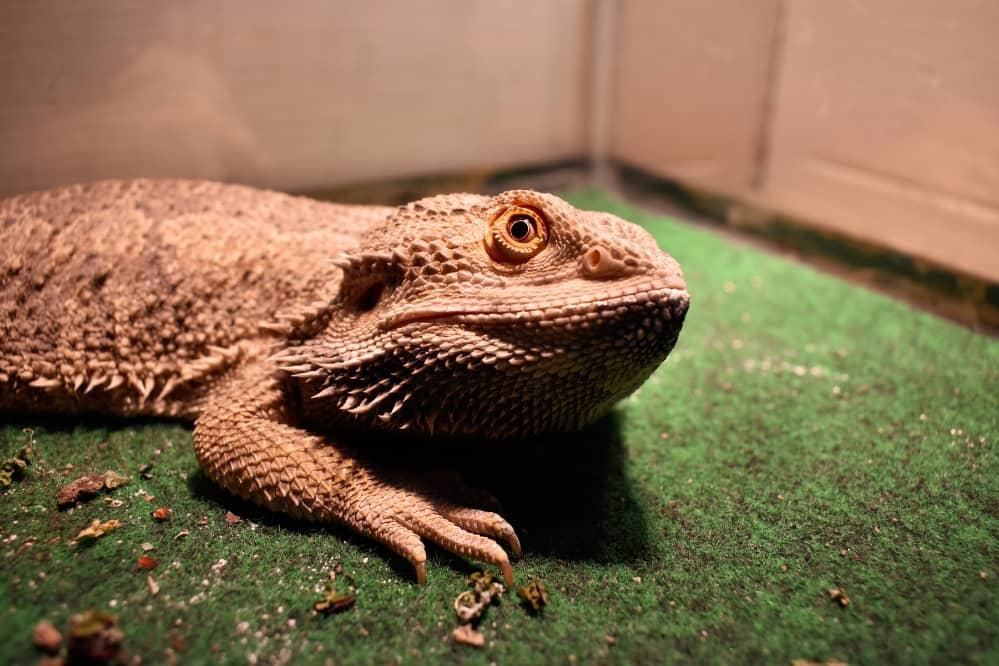Naturally, when you want to adopt a pet, you want to get basic information about it. This is true for reptile lovers too who wish to adopt a bearded dragon. “Do bearded dragons smell?” is one of the few questions reptile fanciers frequently ask. In addition, many first time beardie owners feel (a few weeks after adopting a beardie) that their bearded reptile smells like fish and wonder, “why does my bearded dragon smell like fish?” If you are one of such owners, this guide is for you.
Do Bearded Dragons Smell?
No, in contrast to what most people think, bearded dragons don’t smell. This is because, unlike many other animals, beardies don’t have sweat glands, so they don’t produce any specific smell. In addition, contrary to other territorial animals, beardies don’t mark their territory with a smell.
However, bearded dragon’s skin can pick up smell of different things present in its surrounding. So if you feel your bearded dragon is smelly, there must be something nearby, giving that particular smell to your beardie. Sometimes your beardie may smell like food he ate recently; however, such a smell is very faint and doesn’t last too long. If your bearded dragon continuously gives off a strong smell, there must be something wrong with its environment, and you must observe the tank’s hygiene keenly.
Why Does My Bearded Dragon Smell Like Fish?
Mostly new beardie owners (sometimes seasoned ones, too) complain that their bearded dragon smells like fish. As mentioned earlier, beardies don’t smell, but they may smell like something lingering in their environment. Usually, beardies smell like fish when you don’t pay attention to their enclosures’ sanitation. Leftover food particles, poop, urates, and bacterial and fungal growth can make your bearded friend smell like fish.
Reason 1: Tank Hygiene
Maintaining good tank hygiene is crucial to ensure your beardies are healthy and keeping them from becoming smelly. Tank hygiene can be divided into three segments.
Beardie’s Waste (Poop & Urine)
Like any other animal, bearded dragons also urinate and defecate, and their poop and urine have an unpleasant odor. Feces and urine are the most common factors that make bearded dragons smell bad. Though feces or urine don’t affect your beardie when removed immediately; however, if left for a long duration,beardie’s skin will absorb the smell. In addition to making your bearded dragon smell fishy, feces are also a source of salmonella and other parasites that can negatively affect your beardies’ health.
Left Over Food
After poop and urine, second major reason that can make your breaded dragon smell like fish is leftover food. Irrespective of whether you feed vegetables or insects, it can rot within few hours and give off a bad smell,making your bearded dragon smell fishy.
In addition, insects like crickets, also poop, and can further escalate the bad odor of tank. Therefore whether it is leftover food or insects remove them immediately.
Bacterial And Fungal Growth
If you don’t follow a regular cleaning schedule to keep your beardie’s tank clean, bacterial and fungal growth inside the tank increases the risk of health issues and produces characteristics bad smell. Your beardie’s skin absorbs this smell, and will begin smelling bad.
Reason 2: Your Beardie Is Sick
Sometimes when bearded dragons are sick, they may stink. A few common issues that can make your beardie smell bad are fungal or bacterial infection, tail rot, mouth rot, parasites, etc.
Related article What Are Signs of Sickness in Bearded Dragons?
Reason 3: Poor Quality Substrate
Although many people don’t pay attention to this, but it’s crucial to know that poor quality substrate can also be a source of bad smell in bearded dragons. Especially when reptile parents opt to buy a cheaper and low-quality substrate (like wood chips), it stinks very quickly. Furthermore, such substrates are sometimes treated with different chemicals that give off weird and unpleasant smell. In addition to giving a bad smell, these chemically treated substrates can also cause different health issues.
Here it’s crucial to remember that if you don’t clean tank regularly, even good-quality substrate can make your bearded dragon stink.
Reason 4: Improper Environmental Conditions Inside Vivarium
Though bearded dragons need a certain level of moisture and humidity in their environment,it should be within a ideal range. Higher than recommended humidity and moisture promotes bacterial and fungal growth inside the tank, thus producing an unpleasant smell. A beardie living in such an environment will likely smell bad or fishy.
How Can I Prevent My Bearded Dragon From Smelling Like Fish
Let’s go through a few simple steps you can take to keep your bearded dragon from stinking or smelling like fish.
Clean The Enclosure Regularly
The first thing to pay attention is the cleanliness of the tank. Generally, the cleanliness schedule of beardie’s tank consists of three phases.
- Spot Cleaning: It means immediately removing poop, urine, or leftover food with the help of a paper towel. You should spot clean your beardies tank at least one to two times daily.
- Regular Cleaning: It includes cleaning all the surfaces (substrate, accessories, etc.) with nontoxic disinfectant at least once a week.
- Deep Cleaning: It includes removing everything from the tank and thoroughly washing and cleaning the tank with soap and water. Before putting things back, ensure that everything is properly cleaned and dried. Deep cleaning is recommended once a month.
Properly Maintain Humidity
The next step is to observe the humidity level inside your beardie’s vivarium keenly. Generally, experts recommend maintaining humidity between 35% to 40%. Anything above this promotes bacterial and fungal growth leading to bad smell exuding from tank and your bearded dragon. So the best way to observe humidity level is to install a good quality hygrometer inside the vivarium.
Use Good Quality Substrate
Avoid using lower quality or cheaper substrates (like sand, wood chips, etc.) because such substrates aid in smell production inside the tank. Always go for substrates like reptile tiles or carpets. Such substrates are easy to clean and don’t absorb moisture, thus hindering bacterial and fungal growth.
Bath Your Beardie
Bath your beardie regularly, even if he does not smell bad. Regular baths keep your beardie clean and smell-free and help him get proper hydration.
Related article Can I Bathe My Bearded Dragon in Tap Water?
Call To Vet
Your bearded dragon may be sick if it smells fishy even after all the above recommendation is checked. In this case, take vet’s advice immediately before bearded dragon’s health further deteriorates.

